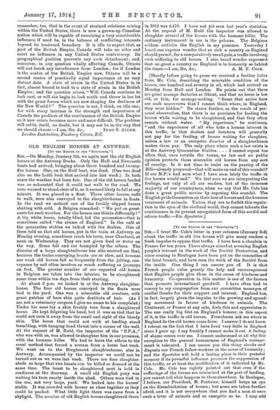OLD ENGLISH HORSES AT ANTWERP.
[To Ter Eamon or THE SPECTATOR."'
Sus,—On Monday, January 5th, we again met the old English horses at the Antwerp Docks. Only the Hull and Newcastle boats had arrived, bringing about three hundred and twenty- five horses. One, on the Hull boat, was dead. (One was dead also on the Leith boat that arrived late last week.) In both cases the weather had been fair. One of the old horses landed was so exhausted that it could not walk to the road. We were warned to stand clear of it, as it seemed likely to fall at any minute. It was placed in a float. Three other horses, unfit to walk, were also conveyed to the slaughterhouse in &ate. In the road we noticed one of the freshly clipped horses shaking with cold. A Belgian remarked: " We put on great- coats for such weather. For the horses one thinks differently!" A big white horse, totally blind, led the procession—that is sometimes called "the shame of England." In the cafe at the quarantine stables we talked with the dealers. One of them told on that old horses, put in the train at Antwerp on Monday evening, sometimes reach his town, near Charleroi, at noon on Wednesday. They are not given food or water on the way. Some fall and are trampled by the others. The director of a large slaughterhouse has also assured me that, because the trains conveying beasts are so slow, and because our weak old horses fall so frequently from the jolting, con- veyance by rail often involves as much suffering as journeys on foot. The greater number of our exported old horses in Belgium are taken into the interior, to be slaughtered some time within ten days from their starting.
At about 3 p.m. we looked in at the Antwerp slaughter. house. The four old horses conveyed in the floats were tied in the yard. One was a miserable old creature, with great patches of bare skin quite destitute of hair. (As I am not a veterinary surgeon I give no name to his complaint.) Under his nose lay a skin freshly torn from a slaughtered horse. He kept fidgeting his head, but it was so tied that he could not turn it away from the smell and sight of the bloody skin. The horse that could not walk at landing stood trembling, with hanging bead thrust into a corner of the wall. At the request of M. Ruhl, the inspector of the "S.P.A.," who was with us, was allowed to slaughter him in our presence, with the humane killer. We had to leave the others to the cruel method that forced a scream from a horse last week. We went on to the Borgherout slaughterhouse, also in Antwerp. Accompanied by the inspector we could not be turned out as we were last week. There are four slaughter- sheds so large that two beasts can be killed or dressed at the same time. The beast to be slaughtered next is held in readiness at the doorway. A small old English pony wan waiting his turn nearly inside the shed. Others were tied in the one, not very large, yard. We looked into the hones' stable. It was crowded with horses as close together as they could be packed. What little light there was came from a skylight• The number of old English horses slaughtered there in 1912 was 4,479. I have not yet seen last year's statistics. At the request of M. Ruhl the inspector was allowed to slaughter several of the horses with the humane killer. The ordinary instrument in use is the poleaxe. The Belgians seldom criticize the English in my presence. Yesterday I heard one express wonder that so rich a country as England should permit, for a comparatively small gain,a traffie involving such suffering to old horses. I also heard wonder expressed that so great a country as England is in humanity so behind [Shortly before going to press we received a further letter from Mr. Cole, describing the miserable condition of the horses, one hundred and seventy in all, which had arrived on Monday from Hull and London. He points out that there are great sausage factories at Ghent, and that no horse is too old, or thin, for sausage-making. " Some that arrive here are such scarecrows that I cannot think where, in England. they were hidden." He states further, as the result of per- sonal observation, that there is no provision for feeding the horses while waiting to be slaughtered, and that they often remain without water. " My experience," he continues, "and the experience of all who take a human interest in this traffic, is that dealers and butchers will generally not pay for the feeding of horses waiting for slaughter, unless a law or an energetic director of a slaughterhouse makes them pay. The only place where such a law exists is at the Antwerp Quarantine Stables. . . . I cannot repeat too often that, once outside the towns, no law and no public opinion protects these miserable old horses from any sort of cruelty. Is it not time to insist on the passing of the Bill—already prepared—that will make an end of this scandal? If our M.P.'s bad seen what I have seen lately the traffic in live horses would end." We feel sure we are interpreting the feelings, not only of all our readers, but of the immense majority of our countrymen, when we say that Mr. Cole has done a great public service by exposing this scandal. The English pridethemselvea on their love of horses and the humane treatment of animals. Unless they are to forfeit this reputa- tion in the eyes of the civilized world, they cannot tolerate the continuance in its present unregulated form of this sordid and odious traffic.—En. Spectator.]










































 Previous page
Previous page